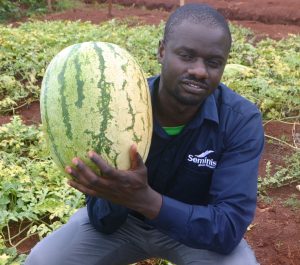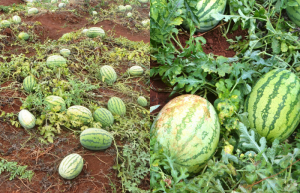Joseph Njenga from the dry-stricken Kiumbu village in Mwea East Sub County has taken advantage of the new craze and has taken up to watermelon farming which earns him over Ksh 700,000 annually.
He says he has made a fortune since he ventured into the agribusiness some eight years ago thanks to the growing demand and ready market for watermelons.
Now a proud farmer, he recalls how he was struggling with small-scale maize and tomato farming on his four-acre piece of land which proved non-viable due to erratic rainfall patterns that is common in the remote parts of Kirinyaga County

Njenga stated, “With Ksh70, 000 which I spend on farm preparation, water pump fuel and buying seeds and pesticides, I’m able to recoup Ksh300,000 -400 000 in each of the two seasons per year.
This is after he sells a kilo of watermelon between Ksh 30 and Ksh 40 in his farm, but stresses the prices pick during dry seasons when people buy in large amounts.
The income he generates from watermelons production enables him to support his family as well as educate his two children.
Njenga has also bought several pieces of land to expand his venture. He, however, says despite being lucrative, watermelon farming is not without its challenges
He narrates, “This area is generally water-scarce, I rely on pumped irrigation water from Kiumbu River which sometimes also goes dry and I have to spend some money using trucks to get water from Thiba River which is far away.”
“Watermelons are prone to disease and this forces me to spend heavily on pesticide, they are very prone to cracking or bursting during and after harvest due to rough handling,” Njenga stated.
Harvesting usually begins 75 -100 days after planting depending on cultivation. He says that watermelons are harvested close to full ripeness as possible; this is when the fruit surface touching the soil is light yellow or when the vine closest to the fruit is starting to wilt.

The farmer noted that watermelons are perishable and should not be dropped during handling, stepped on or stacked too high. They should be handled with care.
“Yielding range between 20-30 tonnes per acre depending on variety and crop management practices,“ he added.
Njenga dropped out of school due to lack of school fees and had to work harder than his peers to earn a living.
He says the only trade he knew well then was farming and that is what has kept him going since then.
“I sat for my Kenya Certificate of Primary Education (KCPE) in 2006 at Kiumbu but could not proceed to secondary school as my parents could not afford the school fees.
“Therefore, I decided to join my mother in rice farming at Mwea in Kirinyaga County,” says Njenga.
His uncles had given his mother some piece of land to grow rice and support the family. He helped her in planting, weeding, harvesting and packaging the rice for the market. Although this was her mother’s farm, he did the job for a fee.
After working for several years on the farm, he saved some Sh30, 000. He then decided to start watermelon farming of his own. A friend had given him the idea of being his own boss.
He used about Sh4, 000 to rent an acre farm; he spent Sh10, 000 to buy seeds and the rest on labour and pesticides.
The 30-year-old would eventually harvest about 15 tons from the piece of land. He sold a kilo at Sh21 raking in close to Sh. 300, 000 gross income that season. This was a good income and it motivated him to take farming even more seriously.
“I was surprised that out of my little initial investment I could get such a return. This encouraged me and I decided to increase the area under cultivation of watermelon,” he says.
Njenga says he prefers either a virgin land or one that has not been used to grow watermelon in the previous season, this way, he avoids pests and diseases.
“It is inadvisable to plant watermelon in the same piece of land as this may spread diseases and pests, lowering yields. This is why I move from one piece of land to the other,” says Njenga.
The farmer says he prefers growing Sukari F1 watermelon variety which he says matures faster and is loved by consumers as it is sweeter.
“The variety matures in 60 days and most traders like it because it sells well in the market due to its nice taste.”He sells his watermelons to traders who come from Kirinyaga, Kiambu and Nairobi.
“At the moment, traders are already enquiring when I will start harvesting and this gives me hope of a ready market as soon as I start the exercise,” says Mr Njenga.
Njenga does most of the work such as spraying pesticide, irrigation and overseeing the overall production process. However, during planting, weeding and harvesting he hires casual employees whom he pays depending on the workload.
He advises the youth who might have faced the same problems in education like him or who are finding it difficult getting a job not to lose hope but venture into agribusiness and “earn good money for decent living”.
“Most youths lose hope in life for one reason or another and this is not right. Agribusiness is the next big thing in the country and beyond. It is, therefore, a good opportunity for the young people to live their dreams,” says the farmer.